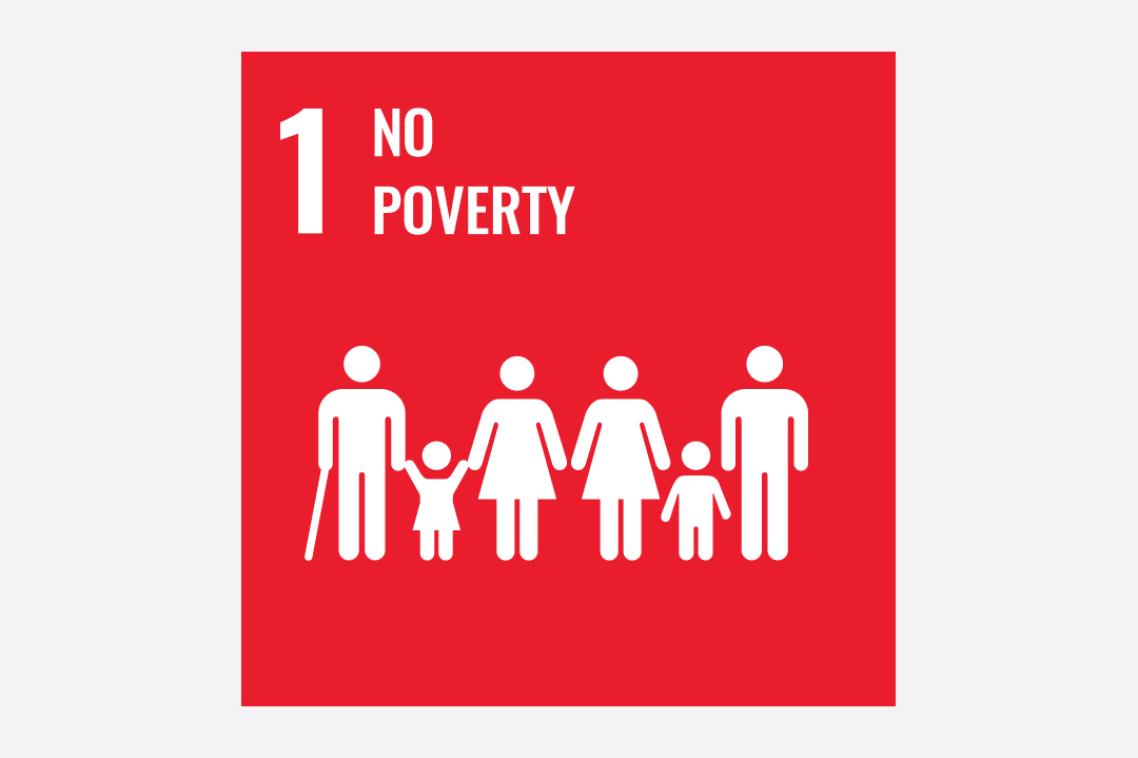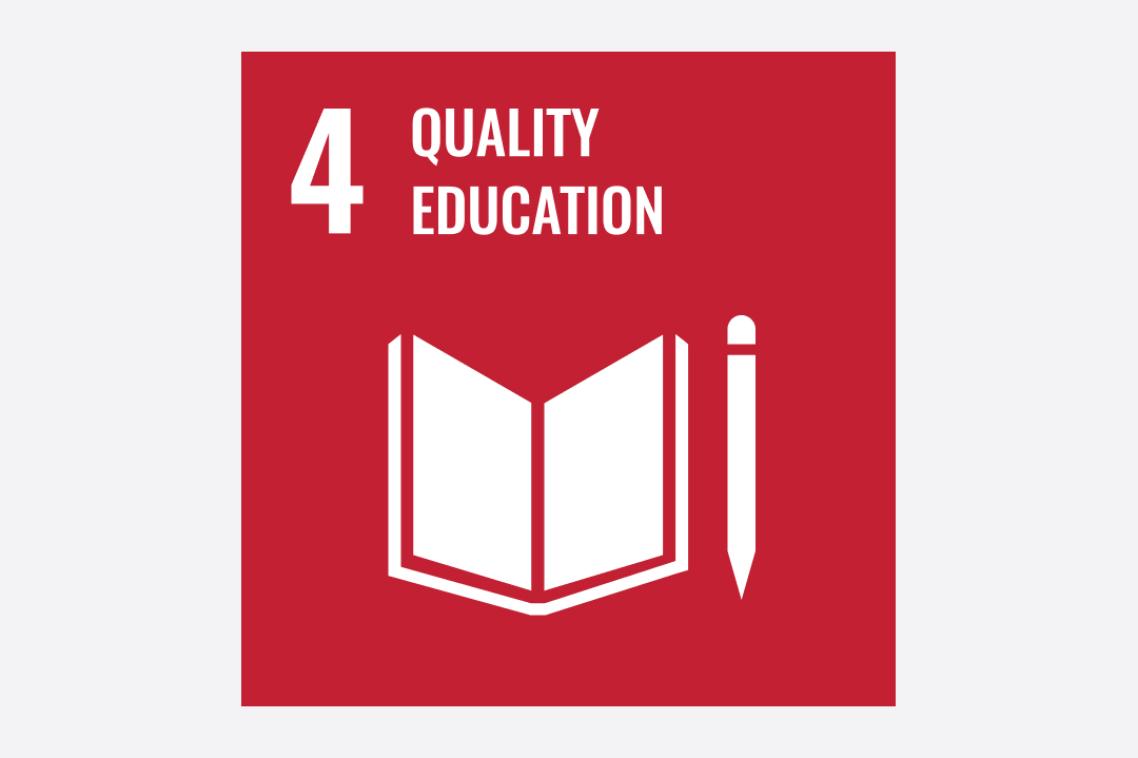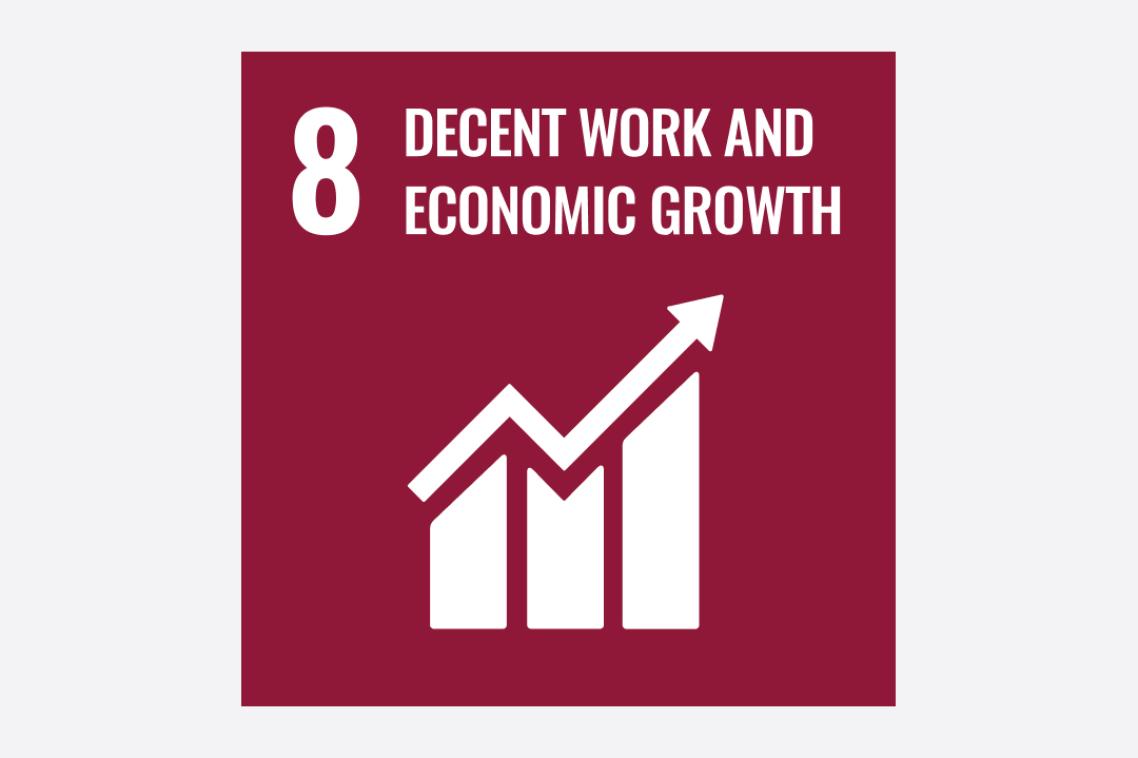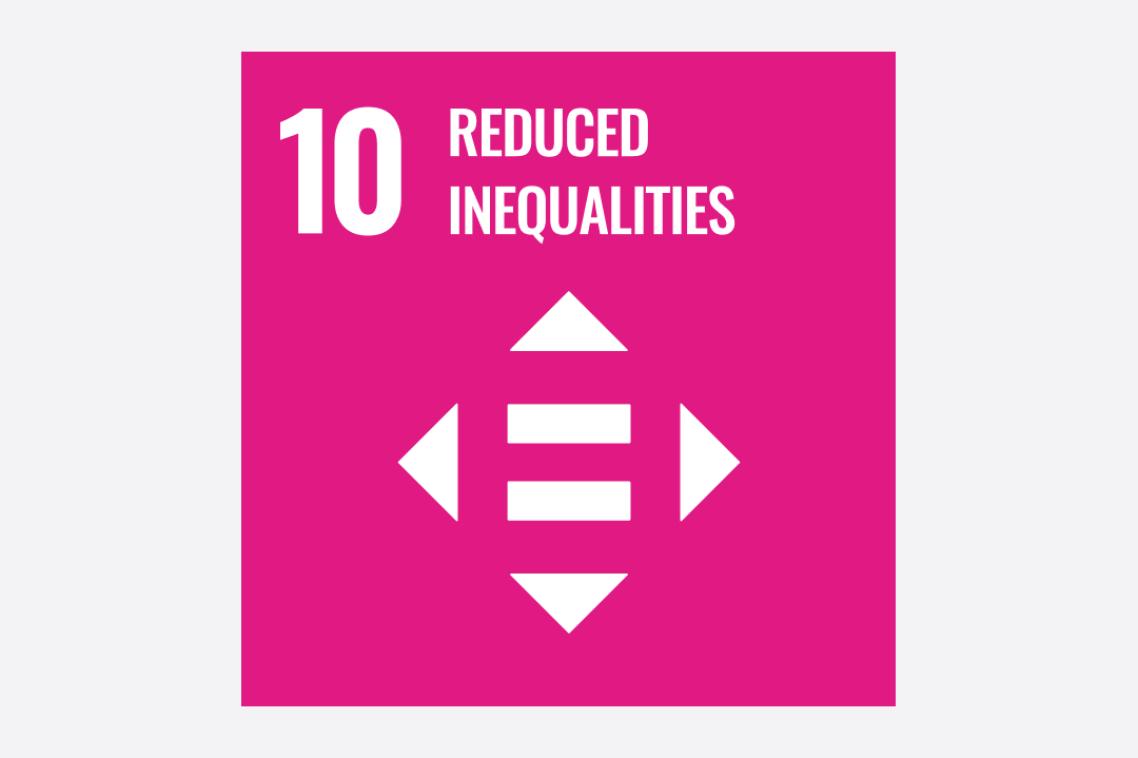SDG 1 – No poverty

2024 progress
The University of Queensland (UQ) actively advances Sustainable Development Goal 1: No poverty through inclusive education, student support, community engagement and impactful research. UQ aims to contribute to the prosperity of Queensland through education and research innovation that has local, national and global impact. The Queensland Commitment aims to recruit 30% of domestic undergraduates from low socio-economic or regional backgrounds. UQ also provides support, financial aid and scholarships to students from disadvantaged backgrounds, directly addressing educational poverty.
With sustainable development principles embedded in teaching programs, including development studies, public health and environmental sciences, students are encouraged to explore solutions to poverty-related issues through policy, innovation and community development.
Community-focused initiatives foster sustainable local enterprises across Queensland and UQ also improves access to critical services through pro bono legal aid activities, nutrition clinics and health services. The UQ Stretch Reconciliation Action Plan (RAP) promotes cultural inclusion and economic empowerment.
Research informs policy on poverty reduction and alleviating disadvantage, while training programs build capacity in understanding and developing strategies for poverty reduction. Collaborations with organisations worldwide contribute to capacity-building in low-income countries and support knowledge exchange on sustainable development.
Read our SDG 1 2024 report (PDF, 231.84 KB)
See how we make a difference across key areas:
University anti-poverty programmes
UQ’s The Queensland Commitment aims to ensure equitable access to education for all across Queensland, including underrepresented groups, with an immediate focus on students from low socio-economic backgrounds, regional or remote areas, and those identifying as Aboriginal and Torres Strait Islander.
Access and progress for low income students
Launched in 2022, The Queensland Commitment (TQC) is a pledge to break down barriers to education and build a brighter future for the state by 2032. This comprehensive and ambitious initiative will deliver evidence-based strategies to build aspiration, grow pathways to higher education and support student success, including equitable access to education.
How we are achieving this
- In 2024 we launched The Queensland Commitment Roadmap, with 58 strategic actions to achieve more equitable education access by 2032. Key admission targets are:
- 30% of UQ’s domestic undergraduate students come from a regional, remote, or low socio-economic background
- ensure that the proportion of domestic students identifying as Aboriginal and Torres Strait Islander reflects the representation of Aboriginal and Torres Strait Islander people in Queensland.
- We committed to annual intake in proven pathway programs by 2032.
- We committed to increasing scholarships for students from underrepresented groups.
- In 2024, we raised more than $31.2 million for The Queensland Commitment, representing 12.4% of our ambitious goal to raise $250 million by 2032.
- We introduced The Queensland Commitment Student Lifecycle Metrics Report, enabling data-driven actions to track and celebrate progress in admissions, enrolments, academic performance and completion rates for students from Indigenous, low socio-economic and regional or remote backgrounds.
- We committed to strengthening partnerships with Queensland schools in low socioeconomic status (SES) areas and Regional University Study Hubs.
- We committed to improving student accommodation availability and affordability.
Alongside increasing admission numbers of students from underrepresented groups at UQ, there are also a number of initiatives to support their transition and success. These include:
- wraparound support services for students on equity-based scholarships, including:
- support to access university, including application advice and financial support to apply
- laptops and funding to purchase books
- support to look for accommodation and to apply for accommodation scholarships
- support to transition into university, including residential camps and pre orientation seminars and workshops
- mentoring across the student lifecycle from high school to graduation
- dedicated case manager for each student
- dedicated space on campus to study
- increased funding for under-represented students to access co-curricular and extra-curricular activities (for example, funded short term overseas study tours, placement grants)
- engaging 338 mentors and 1,625 mentees in 2024 through the 'Get Involved' mentoring program to support both the Learning and Student Experience Roadmap and The Queensland Commitment goals of offering every commencing UQ student the opportunity to connect with a mentor. Mentoring, which is recognised as central to student success, has been introduced across the student lifecycle from secondary school to graduation. This includes mentoring in high school, transition to university mentoring and alumni mentoring programs to support students' transition into employment or further studies.
Living support for low-income students
By 2032, we seek to ensure that 30% of our domestic undergraduate students will come from a regional, remote, or low socio-economic background, with a TQC goal to provide the resources and opportunities for them to realise their academic potential.
How we are achieving this
- UQ provides a number of scholarships for students experiencing financial hardship, including:
- UQ Link Scholarship (renamed The Queensland Commitment Scholarship), which provides assistance to students who have experienced educational disadvantage as a result of financial hardship and who are undertaking tertiary studies for the first time. In 2024, 451 students received a UQ Link Scholarship
- TC Beirne School of Law Leadership, Excellence and Diversity (LEAD) Scholarship, which encourages and supports students from disadvantaged backgrounds to undertake undergraduate studies in Law at UQ
- Aboriginal and/or Torres Strait Islander Architecture Industry Scholarship, which supports Aboriginal and/or Torres Strait Islander students experiencing financial hardship to undertake coursework study
- Aboriginal and Torres Strait Islander Research Scholarships, which provide financial support to Aboriginal and/or Torres Strait Islander students studying a Master of Philosophy or Doctor of Philosophy in any field
- The Order of Australia Association Foundation Scholarship, which helps young Australians to achieve their potential for the benefit of future generations
- The David Malouf AO Scholarship, which supports coursework students in all areas who are experiencing financial hardship.
- UQ Union provides targeted bursaries for students in financial distress, including emergency financial support, placement bursaries, gender affirmation bursaries and assistance for international Higher Degree by Research (HDR) students with families. These initiatives reflect UQ’s dedication to equity, inclusion, and student success.
- Financial Hardship Scheme – During 2024, UQ provided over $130 000 in emergency payments for students experiencing urgent and unexpected financial problems affecting their studies, who were eligible for an emergency hardship grant. These funds are to support students in financial need access books, study materials, laptops, grocery vouchers and public transport. Recipients included homeless students, international students, Aboriginal and Torres Strait Islander students and students under 18 years of age. This pool of money was doubled for 2025 to support more students in financial hardship.
- In 2024, UQ supported 696 Identified low SES students, 140 First Nations students and 12 students on equity scholarships that were assisted with financial support to access books, courses, laptops, grocery vouchers and public transport cards.
- Approximately half of the international students receiving financial support in 2024 originated from countries deemed as low- or lower-middle- income countries.
- In addition to providing nights of emergency accommodation for students in financial hardship or at risk, UQ also has access to a consistent room at UQ Res (an independent student accommodation provider for UQ students), to use for emergency housing, and stakeholder relationships with other student accommodation providers to support short term accommodation needs where there is vacancy.
- UQ provides a list of community based services that students can also reach out to for further guidance and support, as well as some helpful and practical ways to stay on track.
- UQ purchased 25 laptops in 2024 to provide to students in financial hardship, with 6 allocated to date. Students may be eligible to borrow a short-term laptop if their laptop suddenly stops working and they don’t have the money to fix it, or to purchase a new one.
- The UQ Student Union and Student Rights Collective run activities including around placement bursaries, UQU SAS Cost of Living week and promotion of the NUS End Student Poverty campaign.
Case study: The Queensland Commitment – Advancing SDG 1 through educational equity
UQ’s The Queensland Commitment (TQC) directly advances SDG 1: No poverty by recognising educational equity as a clear and powerful pathway out of poverty. TQC seeks to uplift the representation and success of students from low SES, regional, and Aboriginal and Torres Strait Islander backgrounds, who are disproportionately affected by intergenerational disadvantage.
The Queensland Commitment Roadmap, endorsed in 2024, sets out 58 tangible actions that UQ will enact to help deliver on its mission, with many of those actions specifically focused on enhancing educational equity to enhance access, participation and success for students from underrepresented backgrounds.
TQC's comprehensive approach includes setting ambitious growth targets for flagship initiatives such as the Young Achievers Program (YAP), which provides residential camps, mentoring and financial assistance.
The roadmap has also driven the development of an enhanced InspireU program, to offer financial support, enriched experiences and enhanced pathways for Aboriginal and Torres Strait Islander high school students as they progress to studies at UQ.
Additional roadmap actions further reduce barriers to students to help overcome financial disadvantage by:
- expanding pathway programs
- optimising adjustment factors
- improving student accommodation affordability
- enhancing scholarships with inclusive rules and automatic awarding.
This strategic focus ensures TQC is a tangible framework for poverty reduction that is research-backed, informed by community and accelerated through philanthropy. It equips students, who otherwise would not have had access to a university education, with qualifications to secure higher-paying employment and significantly raise their standard of living.
Community and government
UQ delivers a broad range of initiatives aimed at alleviating poverty and addressing community needs. Through entrepreneurial support, inclusive research and accessible services, UQ empowers individuals and small enterprises to thrive. Programs focus on reducing barriers to health, education, legal aid and economic participation – especially for vulnerable populations. By fostering innovation, early intervention and evidence-based policy, UQ aims to strengthen community resilience and promote equitable, long-term outcomes across Queensland and beyond.
Local enterprise and start-up assistance
As one of Australia’s leading research and teaching institutions, UQ is passionate about enriching its entrepreneurial ecosystem and creating leaders of the future.
Through UQ Ventures, entrepreneurs are supported at every stage of their journey, working alongside staff and alumni, and connecting with a wide range of global experts. Support includes both practical and financial assistance towards businesses that:
- are economically sustainable in the long-term
- have positive social impact
- provide real opportunities for the community.
How we are achieving this
- UQ Ventures provides a range of entrepreneurial programs, training, and opportunities for students, staff, alumni, and the broader community. Ventures provides some funding support via competitive processes.
- The Indigenous Business Hub is a unique collaboration with industry to strengthen the positive impact of Indigenous businesses in Australia.
- FaBA Kickstarter program provides successful applicants with access to food technology laboratories and FaBA experts (from UQ, Queensland University of Technology (QUT) and the University of Southern Queensland (UniSQ)) to develop new products through market analysis, prototyping and commercialisation. The FaBA MakerSpace, a fee-for-service laboratory that supports businesses in the food and beverage manufacturing sector, is also available. The Kickstarter Program is a competitive scheme that provides up to $50,000 for small to medium enterprises and start-ups, to conduct research projects that advance the food and beverage industry in Australia.
- UQ’s Executive Education offers training to the community such as Innovation for Growth, supporting industry peers to learn frameworks and tools for effectively managing responses to disruption and change.
Programmes for services access
In addition to The Queensland Commitment, UQ aims specifically to improve access to essential services such as health, nutrition, and legal support. These initiatives focus on reducing barriers, supporting vulnerable populations and promoting early intervention. By enhancing wellbeing and resilience, they contribute to more equitable outcomes and long-term community benefits.
How we are achieving this
- The UQ Pro Bono Centre provides free legal support to communities in need by connecting law students with organisations serving vulnerable groups. Through supervised projects, students assist with legal education, research, casework and law reform, helping those who may not otherwise access justice. Initiatives like the Climate Justice Initiative and the Regional, Rural and Remote (RRR) Project extend services to underserved areas. These efforts improve legal literacy, empower individuals and promote fairness. Through these initiatives, the Centre strengthens community resilience and ensures legal support reaches those who need it most.
- The 360-Kids Community Network addresses the risks associated with starting school for developmentally vulnerable children, such as increased risk of poor health, education and social outcomes. Located within UQ’s Faculty of Health, Medicine and Behavioural Sciences, the network promotes early intervention and prevention, aiming to improve health, learning, and wellbeing before school entry. It focuses on high-risk children and disadvantaged communities, working in partnership with local groups and agencies.
- The UQ Nutrition and Dietetics Clinic provides free, personalised nutrition consultations to the community, helping individuals improve their health and wellbeing. Led by student dietitians under expert supervision, the clinic offers tailored advice for a wide range of conditions – from diabetes and heart health to pregnancy and sports nutrition. These free services remove financial barriers, making expert dietary support accessible to all, especially those who may not afford private care. By promoting healthier lifestyles and preventing chronic disease, the clinic benefits individuals and reduces long-term public health costs, contributing to a healthier, more supported community. No referral is required to attend.
- Health services provided to the community: A range of client-focused health services are available to community members, from children through to seniors, provided by UQ students working under supervision as part of their training. Services include exercise, nutrition, ageing, disability support, psychology, audiology, occupational therapy, physiotherapy, speech pathology, telerehabilitation and dentistry.
Supporting policy making addressing poverty
Throughout 2024, UQ academics participated in policy making at various levels to support implementation of programmes and policies to reduce poverty.
How we are achieving this
- Lifting up the lives of extremely disadvantaged youth: The role of staying in school longer (PDF, 1.36MB): Researchers from UQ’s Faculty of Business, Education and Law collaborated with a researcher from Erasmus University of Rotterdam to examine the impact of staying in school longer on extremely disadvantaged Australian youth. Comparing early school-leavers aged 14–17 to those who left at 18 or older, they found that males who leave school early face higher risks of homelessness, incarceration and substance abuse later in life. No similar effects were found for females, possibly due to differing reasons for leaving school and support programs available. The findings highlight the importance of targeted interventions to keep disadvantaged young males in school to help break cycles of multi-dimensional disadvantage. Overall, they reinforce other results in the education literature that males’ disadvantage in education is a critical policy issue.
- The Alliance for Social Impact is undertaking a research project for Queensland’s Department of Youth Justice, Employment, Small Business and Training. The study explores challenges facing social enterprises (SEs) in Queensland, especially in regional areas, Indigenous-led organisations and start-ups. Using a multi-stage action research approach, including case studies and surveys, the project aims to support SE growth and resilience. The findings will help shape future policies and practices to boost economic and social outcomes across Queensland. This research moves beyond past survey-based studies by fostering collaboration and deeper understanding of the SE sector’s unique needs.
- UQ’s International Comparison Database (UQICD), developed by the UQ School of Economics, is a unique resource that combines international data on real incomes and income inequality to assess economic welfare across different countries. It integrates and analyses large-scale economic data, which is made publicly available for researchers and policymakers to access and apply to global economic challenges. First made available to users in 2011, the most recent major update to the database was in 2023 and further functionality was added in 2024. The website remains public and continues to be used and have impact, with 70% of the 2024 users being new users of the database. The 2024 presentations and articles sourcing data from UQICD included:
- 'Convergence in the World Economy – Evidence from the Last Fifty Years' at the 38th International Association for Research on Income and Wealth General Conference, London, August 26-30, 2024. Presented by Prof. Alicia N. Rambaldi
- M. Moatsos and A. Lazopoulos, 'Stress-testing the international poverty line and the official global poverty statistics'. Humanities and Social Sciences Communications, 11(1):850, 2024. DOI: 10.1057/s41599-024 03260-6. ISBN: 2662-9992. (Profs. Rao and Rambaldi acknowledged for the assistance provided to the authors)
- Hajargasht, G, 'Divergence Between Parametric Income Distributions', Economics Letters, 2024, pp. 111543.
Explore our progress
Read more about how we're making progress toward other Sustainability Development Goals.







